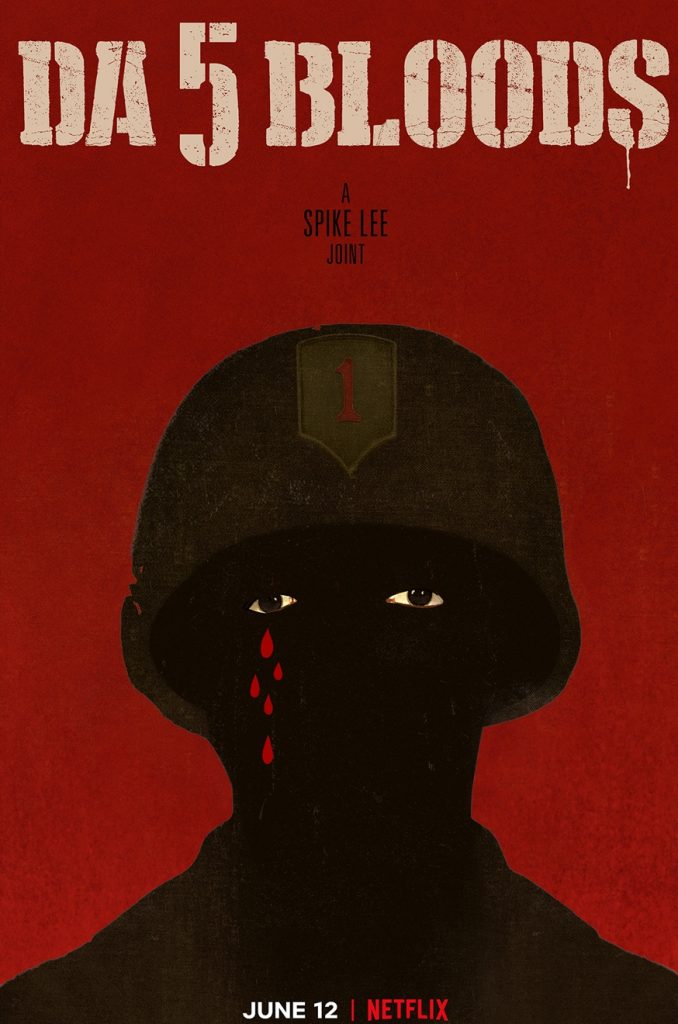Spike Lee’s Da 5 Bloods



Spike Lee’s Da 5 Bloods is an old-man movie the same way The Irishman is Martin Scorsese’s old-man movie, in that this is only a movie Lee could make now, after thirty years of filmmaking, when he has gained the perspective to look back and see cycles repeating throughout life. It is a movie that deals with all kinds of cycles—of violence, of war, of pain, of poverty, of aging. And it is a movie that intimately addresses the specific wound of the Vietnam War and the broader hurt of racism in America. Lee’s style remains as strong and specific as ever, even as he paints on a broad canvas of Vietnam War movies, inserting Da 5 Bloods into a canon that has too often overlooked the Black experience in Vietnam.
Centered on a group of veterans returning to Vietnam in the present day, Da 5 Bloods is part war film, part heist flick. The four surviving “Bloods”, Paul (Delroy Lindo), Otis (Clarke Peters), Eddie (Norm Lewis), and Melvin (Isaiah Whitlock, Jr.), return to Vietnam almost 40 years later ostensibly to retrieve the remains of their fallen commander, “Stormin’” Norman (Chadwick Boseman). They are joined by Paul’s estranged son, David (Jonathan Majors, breakout star of The Last Black Man in San Francisco, which you can stream on Amazon Prime), who struggles with his father, who has become a MAGA-endorsing bigot in his later years. Da 5 Bloods devotes some time to seeing the men reunited, happy to see one another, and situates each man in their later lives. Eddie has become wealthy, Melvin has a beautiful family, Otis reconnects with the daughter he left behind in Vietnam, and Paul has become bitter and resentful after a lifetime of frustrated ambitions and dashed hopes.
But things quickly go downhill. After a night partying in the Apocalypse Now bar—a real place that exists in Ho Chi Minh City, because irony is dead—the real mission of the Bloods is revealed: to recover gold they buried in the jungle. Sure, they’ll find Norman’s remains while they’re at it, but really, they want that gold. Lee juxtaposes the Bloods present-day hike to find the gold with occasional flashbacks showing how they came to bury it and what really happened to Norman. Because Lee did not get a Scorsese-esque gargantuan budget, his flashback scenes feature Lindo, Peters, Lewis, and Whitlock alongside fresh-faced Boseman. The effect is poignant, not only suggestive of how these memories follow the men into their old age, but also strikingly illustrating that Norman, cut down in his prime during someone else’s unjust war, is all the promise and potential of youth with none of the fulfillment of life.
Lee peppers his film with documentary footage and photos, contextualizing the Black American experience in Vietnam with the Civil Rights movement back home in America. Van Veronica Ngo (the ill-fated Paige Tico in The Last Jedi) appears as Hanoi Hannah, a Radio Hanoi broadcaster who read propaganda during the war. Hanoi Hannah reminds the Black troops there is another fight happening at home, one much more personal to them than the mystifying American justifications for the Vietnam War. She also drops a factoid on the audience: that though Black Americans make up 11% of the US population, they represent over 30% of the troops in Vietnam. It’s a staggering statistic that highlights the inherent imbalance in the US draft.
The same contextualization is not applied to the few female characters in the film, though. Otis’s daughter, Michon (Sandy Huong Pham) and his Vietnamese lover, Tiên (Lê Y Lan), are pretty one note, and a French land mine activist, Hedy (Mélanie Thierry), is little more than a damsel in distress. And I get it, this is not a film about Michon and Tiên, or Hedy, but Lee is working so hard to contextualize the Vietnam War and Civil Rights movement, and the experience of being caught between the two, that it does stand out that he offers so little context for the women entangled in post-war politics and social realities.
Still, Da 5 Bloods has a lot working for it, and as a character study of the long-term effects of PTSD, guilt, and trauma, it is a rich and lively work. As a commentary on the Vietnam War, American race relations, and the entwining of the two, it is sharp and devastating. And Lindo is simply fantastic, giving a career-best performance as the tortured Paul, while Lee gets a lot out of his war scenes, even though they are actually quite small, featuring only a few actors and basically one location (I would like to see the movie Lee could make if he was given a Scorsese-esque budget). Taken with BlackKklansman, it feels like Lee has hit a whole new level in his work. Da 5 Bloods is as ambitious and urgent as Spike Lee has ever been.

